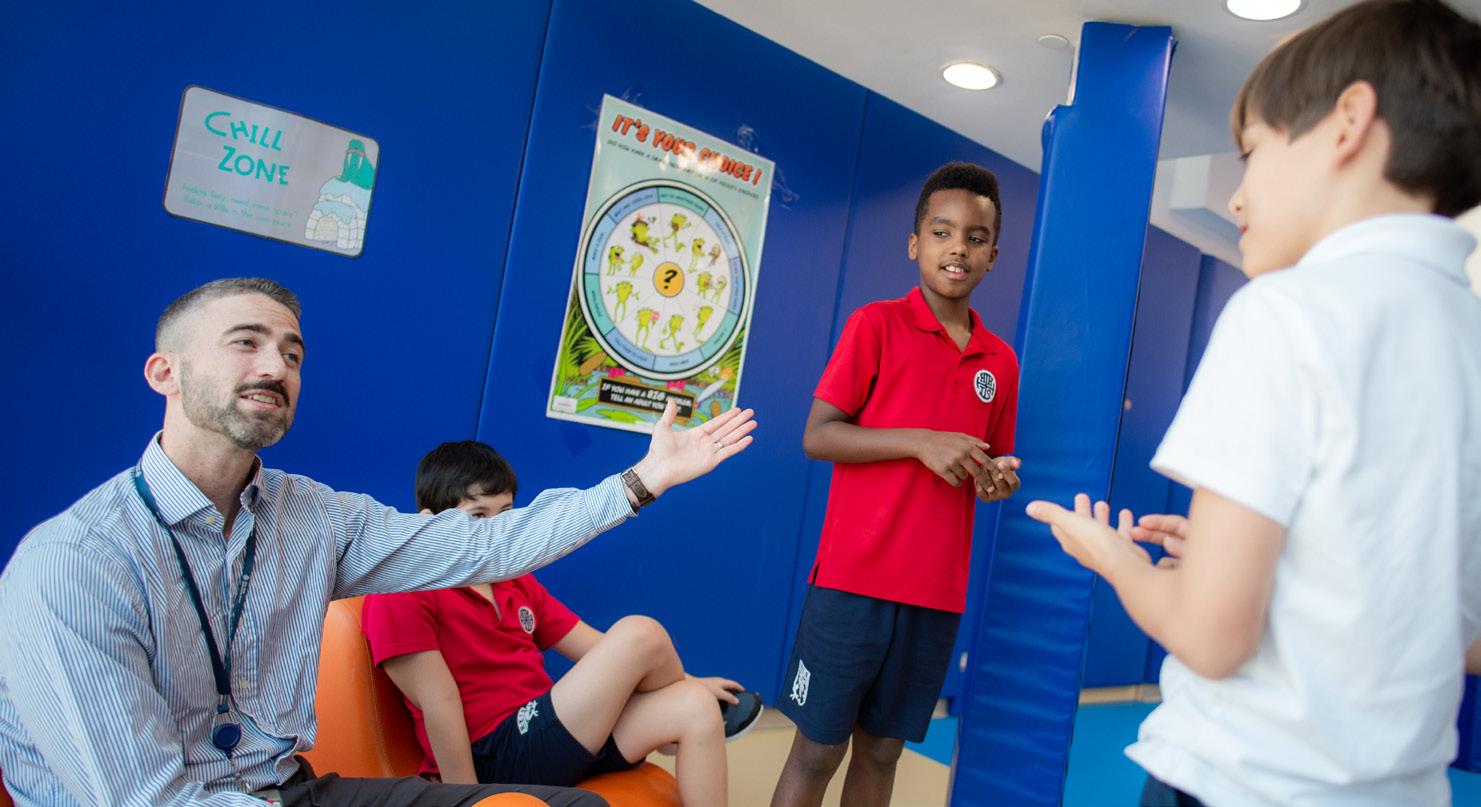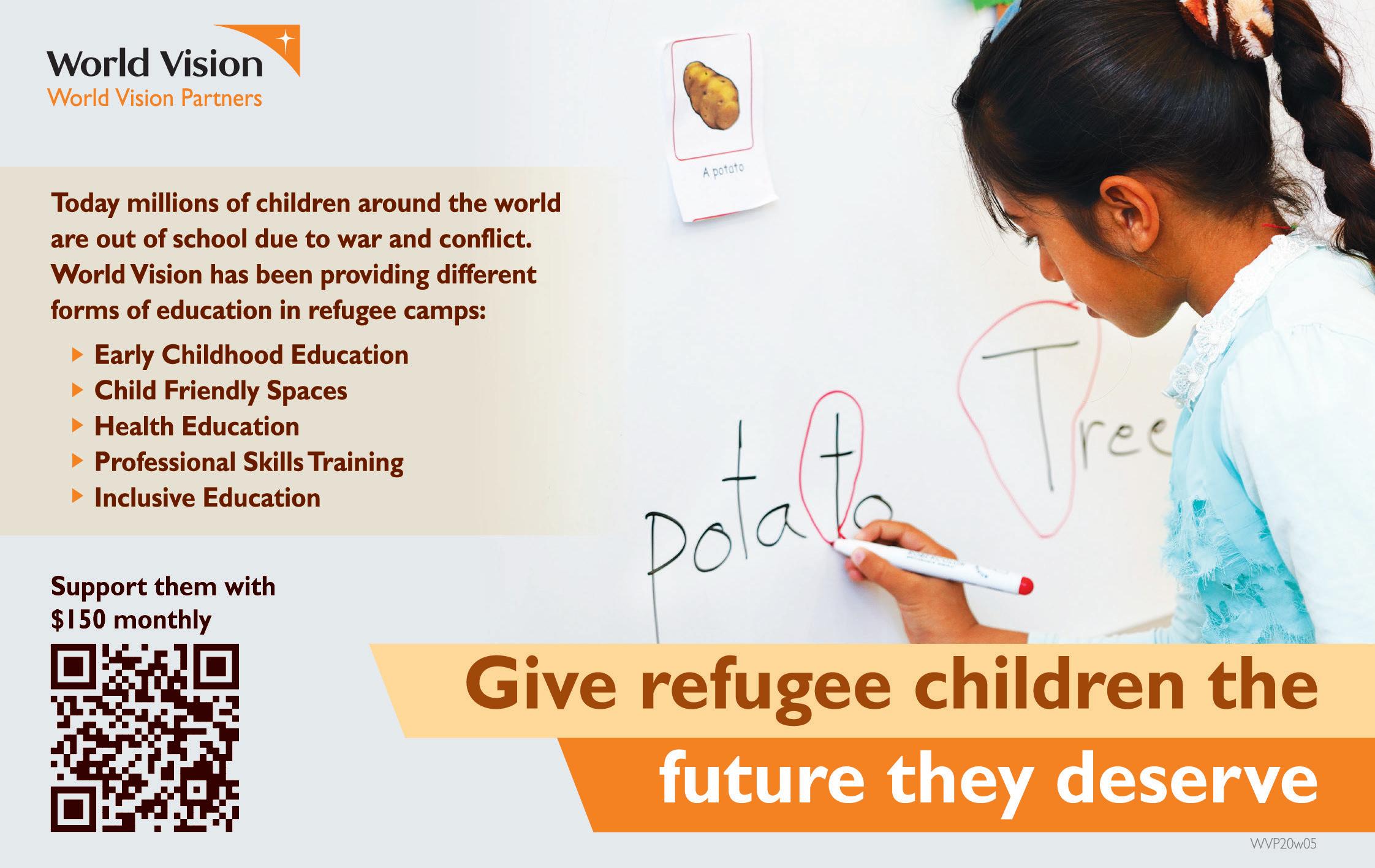
7 minute read
MUST HAVES

Velvet eye mask
Advertisement
$156 from TONIC
amara.com
$110 from Lush
lush.com
Chateau La Grave A Pomerol 2007
$500 from The Bottle Shop
Tender is the night massage bar
thebottleshop.hk Red wine glass set
$720 from Indigo Living
indigo-living.com

Cosy night in

Netflix and chill in style with these home comforts. By Nicole Slater

Goddess bath bomb
$85 from Lush
lush.com
Sublime Replenishing Night Masque
$920 from Aesop
aesop.com


Swiss Miss marshmallow lover cocoa mix
$28.5 from ParknShop
parknshop.com


Piet I geo cushion cover
$250 from Home Essentials
homeessentials.com.hk

THE FUTURE OF EDUCATION

Katrina Lau meets the people paving the way to a new era of learning
Striving through social unrest and coronavirus, the past academic year has been both challenging and rewarding. Tough times teach us the best lessons and 2020 has taught us the importance of resilience, adaptability and flexibility in the face of adversity. Having experienced remote working and learning, we’ve seen the value in face-to-face interactions and also delved into the possibilities of virtual connections.
Teachers, technology professionals, students and parents share their concerns and experiences adapting to this new era of learning.
Kevin Fields, Counsellor from Hong Kong International School (HKIS)
From attending real-time Zoom lectures to connecting with friends via online platforms, the increase in screen time is a growing concern for many parents. Kevin Fields counsellor HKIS, believes striking a balance and setting appropriate limits is crucial to get the best out of this technology.
“Under such unusual circumstances, what is considered normal needs to be adjusted and parents can help by making things more flexible,” he says.
As grown-ups, we may feel stressed by changes, the same goes for children. They used to get home from school and enjoy leisure time, but social distancing turns their comfortable space into a studious environment.
Without being able to talk to their friends and have quality playtime, some may show signs of stress trying to adjust to the situation.
“Let your child be the teacher from time to time and engage in what engages them,” Fields says. In April 2020, as the world was going through its worst wave of Covid-19, the UN’s Educational, Scientific & Cultural Organisation estimated that 91.3 percent of the world’s students were affected by school closures. Google wanted to help.
“Since the beginning of the Covid-19 outbreak, Google has been looking at ways to better support remote teaching and reimagine the learning environment,” says
We are lucky to live in the time where we can maintain relationships and connect with others electronically. While social platforms facilitate kids in developing interpersonal relationships, it can also be overwhelming sometimes. Leonie Valentine, managing director of sales & operations at Google Hong Kong. Google found there are more than 140 million users for G Suite Education in June 2020. The free suite of tools boasts learning tools

“Students and parents should take a break from the news sometimes. It’s great to be informed, being overly informed leaves little mental energy for other endeavours and can have a deleterious
A technology perspective
effect on overall mental health,” he says.

designed for the classroom that fosters collaborative mindsets.
“Bringing attention to safer internet practices is more important than ever,” Leonie says.
Internet safety and proper usage of technology are common concerns when it comes to young kids. In light of the increase in young users, Google Hong Kong launched two programs focused on internet safety. Through its interactive program called Be Internet Awesome, kids can learn the fundamentals of digital citizenship and explore the online world confidently.
So what does this mean for the future of learning? Just as working from home is made possible, education can be taken under the roof and substitute lessons in classrooms. “While it may be too early to predict what the future holds, it’s clear that deeper integration of technology and digital learning could help make education more accessible and equitable long beyond Covid-19,” Valentine says.
As a high school student Esther, aged 17, returned to Hong Kong after her school closed in England. She spent two weeks in quarantine when she returned home and is now working remotely via online classes.
“I learn the best when I can interact with other students and have discussions and debates about certain topics with teachers,” Yeung says.
High school topics are more complex and abstract, pure chalk and talk via video conferences are not as effective as face-to-face classes. “I think people really want to get back to school and see their friends. It can get quite boring being at home by yourself. I really do want to get back.”
Winston Luk, aged 17, is also a high school student in the UK who returned to Hong Kong due to the pandemic. Like Yeung, Luk finds learning and studying from home to be quite the challenge.
“Trying to focus and do your own work is the worst part, I struggle to focus and there are too many distractions at home,” Luk says. The fast and widespreading coronavirus leaves no time for students and teachers to adapt to the innovative learning environment. Besides coping with sentiments of leaving school in a blink of an eye, Luk has to do Zoom lessons on UK time, which makes the process a lot harder.
A parental perspective
Mother of three Karen Ng

A learning perspective
Students Esther Yeung and Winston Luk

With children aged 11, 16 and 19, Karen Ng can easily identify what challenges each age group faces while online learning.
For her youngest child, face-to-face lessons usually include interactive play and active learning. “They find it hard to sit still for long periods of time, with no interaction the classes can seem a bit dull,” Karen says. Her oldest daughter, aged 16, has found subjects like maths challenging, as it requires repeated explanations and practice which is difficult to do online.
“With Zoom or Google Hangouts, the kids are nervous to ask questions,” she says.
When trying to complete worksheets and exercises, Ng noticed that her daughter didn’t quite grasp a full understanding of the concepts and believes a classroom setting is more interactive and discussion-provoking.
Social distancing also means kids are studying alone and not seeing their friends as much. “We have to think about what activities they can do, I still let them see their friends but not as frequently,” she says, adding it is important for parents to help their kids stay connected with peers.
Nurturing students in the age of virtual classrooms
Founder and principal tutor of Young Philosophers, Peter Andrews shares some tips for making remote learning more effective.
Engage with students
As with face-to-face lessons and engagement in virtual classrooms is crucial for effective learning. Young learners’ chances of remaining focused are higher, for example, when lesson topics are intriguing yet relatable to their world experience.
Understand your students
It is crucial for teachers to know learners well enough to tailor learning experiences. I welcome all new students in a one-to-one online session to understand more about them as people. Knowing the students better helps me adjust the syllabus, teaching pace and lesson delivery to their needs.
Make use of technology
Virtual teaching has its advantages. Use break-out groups on virtual platforms to divide students so that you can listen in to discussions more easily. Mixing in animations and visual stimulations, in combination with skilful questioning, is also a captivating means to integrate thought-provoking discussions.
Equip students with philosophical skills
Living in this evolving world, it is positive to stay calm and think rationally. Through learning to think philosophically students can develop their capacity

for reasonable discussion which, in my opinion, is much needed today and always. For more information visit youngphilosophers.net












